Diplomacy as Afterthought Wins US Few Mideast Converts
Diplomacy as Afterthought Wins US Few Mideast Converts
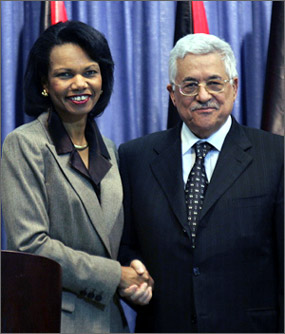
CAIRO: While elaborating on his new Iraq war plan, President Bush announced that he was sending Secretary of State Condoleezza Rice to the Middle East on a serious diplomatic mission. Political leaders, though skeptical, had hoped that Rice would have a specific plan to break the Palestinian-Israeli deadlock and lay the foundation for a Palestinian state. They had hoped that a breakthrough on the Palestine-Israeli front would create political momentum for an eventual resolution of the Iraq conflict. On both counts, media commentary and overall reaction expressed disappointment with the initial results of Rice’s mission.
Rice won diplomatic support by “moderate” Arab and Gulf countries, including Saudi Arabia and Egypt, for President Bush’s new plan to deploy 21,000 more troops in an effort to stabilize Iraq. Rice spoke with pro-American Arab governments, who are deeply anxious about the spiraling sectarian violence in Iraq and its potential spillover into their societies. They also fear that Shiite Iran is consolidating its influence in the new Iraq and backing radical Islamist forces opposed to the status quo in the Middle East. In their eyes, Iran is stirring future trouble in their countries and endangering their stability.
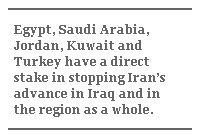
Egypt, Saudi Arabia, Jordan, Kuwait and Turkey have a direct stake in stopping Iran’s advance in Iraq and in the region as a whole. Rhetorical support for Bush’s new war plan reflects their fear that US withdrawal from Iraq would establish Iranian supremacy in the war-ravaged country and also further endanger minority Sunni Arabs in Iraq, planting the seeds for a transnational Sunni-Shiite struggle.
Although symbolically important, support by Sunni dominant Arab countries will have little practical significance for the task at hand in Iraq. To begin with, their hands are tied by internal opposition to any kind of a concrete initiative, such as military intervention, seen to assist the Bush administration in Iraq. Arab public opinion is less worried about Iran and more critical of US foreign policy.
Next, the Shiite-led government in Baghdad is increasingly protective of their new domination. The ruling Shiite coalition is wary of inviting intervention by Sunni-dominated neighbors, even though pro-Western Arab leaders have little influence over their Sunni Iraqi counterparts, who are splintered into multiple factions and frequently targeted by armed Shiite militias. A recent veiled threat by the Saudis, that they would intervene in support of the Sunnis in case of US withdrawal, is taken seriously by the ruling Shiite coalition and reinforces its suspicions of Sunni neighbors.
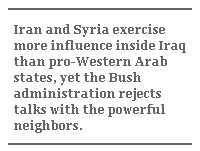
Iran and Syria exercise more influence inside Iraq than pro-Western Arab states. Yet the Bush administration rejects talks with Iraq’s powerful neighbors, Iran and Syria, saying the two countries support terrorism. “Do we have so little confidence in the diplomats of the United States that we’re not willing to let them talk with somebody we disagree with?” Lee Hamilton, the Democratic co-chair of the Iraq Study Group, asked the House Foreign Affairs Committee Friday.
If the moderate Arab support for Iraq strategy is empty, the US attempt to resolve the Israel-Palestine conflict may have come too late. Iran’s rising influence seems to spread as far as Palestinian Sunni Hamas, as Rice also pitched President Bush’s plan for a three-way summit, most likely with Rice herself, to try to reopen stalled peace talks between Israelis and Palestinians. A great idea on the surface, but interviews with Palestinians and Arabs suggest that Rice’s visit aimed more at bolstering the internally besieged President Mahmoud Abbas than at achieving a breakthrough in the peace process.
At the moment, Fatah, the movement led by Abbas, is pitted in a deadly power struggle against Hamas. Many Palestinians point to the debilitating economic sanctions, imposed on them by Israel, the US and Europe since Hamas swept parliamentary elections one year ago, as reason for the increasing internal tensions between the two groups.
The US and Israel have pledged about $200 millions to bolster Abbas and counter Hamas, who retains a majority of the Palestinian parliament. There is a real danger that American and Israeli support for Abbas will turn him into a “collaborator,” discrediting him in the eyes of the Palestinians. “Bush sent Rice to incite us against one another,” a Palestinian activist told me. Other Palestinians said that American and Israeli backing for Abbas will likely backfire and play into Hamas’ hands.
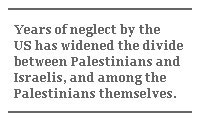
Arabs also criticized Rice’s silence when, during her visit, the Israeli government invited bids for the construction of dozens of homes in the largest Jewish settlement in the West Bank, violating pledges by Israel to Washington to halt construction under the roadmap plan, which details a timeline for the Palestinians and Israelis to reach an agreement. Furthermore, Israelis demanded that Rice pressure the Palestinians into ending terrorist attacks.
Newspaper editorials throughout the Arab world opinioned that Rice did not possess a plan for advancing a Palestinian state, and that she repeated such vague terms as “political horizon” and “roadmap.” Rice also steered clear of the thorny issues of occupied East Jerusalem, which the Palestinians want as their capital, and removing Jewish settlements from the West Bank, as was done in Gaza.
Interestingly enough, both Ehud Olmert and Mahmoud Abbas soon may not be in positions to negotiate for their people.
After the botched war in Lebanon during summer of 2006 and many allegations of political corruption, Olmert faces pressure to step down as prime minister. Chief of Staff Lt. General Dan Halutz has already resigned in payment for the mass failure in Lebanon.
Similarly, Abbas is preoccupied with his bloody internal power struggle with Hamas, and cannot sign a settlement that does not include East Jerusalem as the capital of a future Palestinian state, the removal of settlements from the West Bank and a legitimate resolution for the plight of refugees.
It is no wonder that Abbas informed Rice that he rejected a proposal to establish a temporary Palestinian state within temporary borders lest Israel’s separation will become a de facto frontier if permanent status negotiations fail.
Symbolically, Rice’s Middle East peace talks and potential plans are Important, but they probably hold little hope for either stabilizing the deteriorating security situation in Iraq or laying the groundwork for “a political horizon that will lead to a Palestinian state.”
Years of neglect by the Bush administration has widened the divide between Palestinians and Israelis, and among the Palestinians themselves. In the case of Iraq, the Bush administration’s strategy widens the divide between Sunni-dominated countries like Egypt and Saudi Arabia, and Shiite-dominate Iran and Shiite-controlled Syria with serious repercussions for regional and global security.
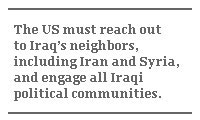
In short, while the rhetorical support by moderate political leaders does not hurt, it does not provide the Bush administration with a way out of its predicament in Iraq or the predicament between Palestinians and Israelis. The Bush administration must reach out to Iraq’s neighbors, including Iran and Syria, and engage all Iraqi political communities.
The weakening of extremist forces in the region, as well as laying a brave vision for a Palestinian-Israeli peace settlement, requires sustained commitment and real investment by President Bush himself and his administration. Taking this task up as an afterthought while grappling with deteriorating Iraq situation, Washington may only be exposing the hollowness of the initiative. It may be too little, too late.
Fawaz A. Gerges, a Carnegie Scholar and visiting professor at the American University in Cairo, is the author of “Journey of the Jihadist: Inside Muslim Militancy.” He holds the Christian Johnson Chair in Middle East and International Affairs at Sarah Lawrence College.